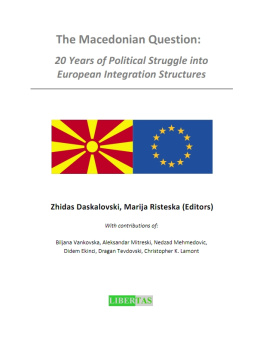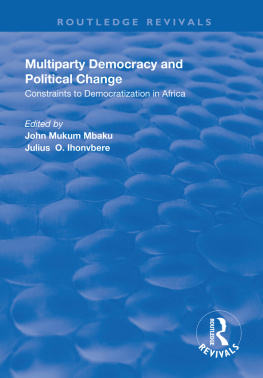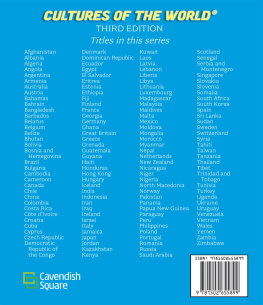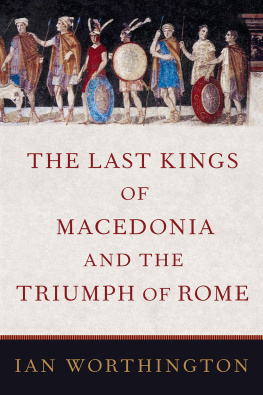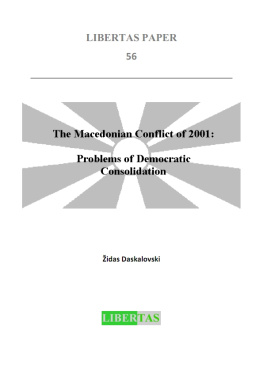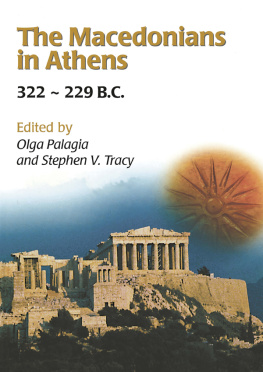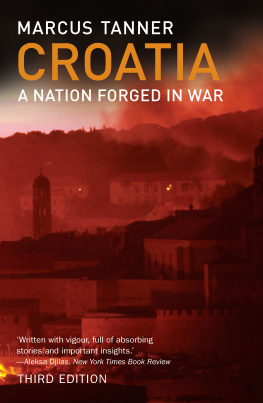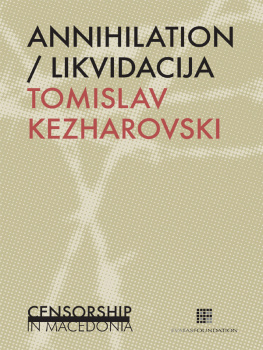Bibliografische Information der Deutschen Bibliothek
Die Deutsche Bibliothek verzeichnet diese Publikation in der Deutschen Nationalbibliografie; detaillierte bibliografische Daten sind im Internet ber http://dnb.ddb.de abrufbar
The map of Macedonia after the Table of Content has been taken over from the CIA World Face book, 2012.
Rangendingen/Germany, May 2012
by LIBERTAS & CRPM
LIBERTAS Europisches Institut GmbH,
Lindenweg 37, 72414 Rangendingen, Germany
Phone +49 7471 984996-0
Fax +49 7471 984996-19
eMail (also for orders) :
www.libertas-institut.eu
In cooperation with:
Center for Research and Policy Making (CRPM),
St. Cico Popovi c 6-2/9 ,
1000 Skopje, Macedonia,
Phone: +389 2 3109932
eMail:
ISBN 978-3-946119- 08-1 (epub)
ISBN 978-3-937642- 22-2 (MobiPocket)
ISBN 978-3-937642-23-9 (print)
Table of Contents
Content
Map of Macedonia and the neighbouring states
Introduction by the E ditors
Zhidas Daskalovski / Marija Risteska
The Procrustean Bed of the State Building in the Republic of Macedonia (1991-2011)
Biljana Vankovska
On Macedonias N ation B randing
Aleksandar Mitreski / Nedzad Mehmetovic
Rethinking the Role of International Organizations in State Building:
The UN, the OSCE, and the EU in Macedonia since 1991
Didem Ekinci
Economic Development in Macedonia: Issues and Challenges
Dragan Tevdovski
Forging Transitional Justice: The Reconciliation of Law and Transition in Macedonia
Christopher K. Lamont

Introduction by the Editors
Zhidas Daskalovski
Modern Macedonia emerged in 1945 as one of six constitutive republics of the Socialist Federal Republic of Yugoslavia (SFRY). When Yugoslavia disintegrated in the second half of 1991, Macedonia chose to assert its own independence rather than remain in a truncated Yugoslav state likely to be dominated by Serbia without the counterbalancing influences of Croatia and Slovenia. Macedonia declared independence on 8 September 1991, and today is a democratic multiparty state with a population of around 2 million.
According to the 2002 census results, Macedonians make up 64% of the total population, while Albanians are the biggest ethnic minority with 25%. Macedonias reforms in the last 15 years have been focused simultaneously on three issues: state building, democratic development and establishment of a functioning market economy. During the 1990s Macedonian political elites clashed with their ethnic Albanian counterparts over the basic idea behind the concept of the state. Various elements in the constitution, the census taking, laws on education, local self-government, and public display of national minority symbols, the ethnic make-up of the police, army, as well as the public administration, were all contested by ethnic Albanians in this period. pitting ethnic Albanian grievances against Macedonian fears for their countrys security and integrity.
While ethnic Macedonians have insisted on a unitary nation-state, ethnic Albanians have refused to be considered as an ethnic minority in a Macedonian nation-state and have advocated for an official bi-ethnic state system. Political transformation was formulated as a zero-sum game,
Armed conflict erupted between Albanian rebels and government forces in 2001 but was quickly ended through an EU- and U.S.-mediated agreement, signed in August of that year. The so-called Ohrid Agreement envisioned a series of political and constitutional reforms, fulfilling much of the demands raised by the Macedonian Albanians throughout the 1990s and introducing some features of power sharing, such as a system of double majorities requiring consent from minorities represented in the parliament to key decisions of parliament, a substantial degree of municipal decentralization, equitable representation in the public administration of the non-majority communities, as well as confidence-building measures to overcome the immediate consequences of the 2001 conflict. Furthermore, the agreement established the principle of achieving equitable and just representation in public administration at the national and local level as the highest priority, a key reform in the public sector.
The process of interethnic consolidation based on the Ohrid Agreement is supported by the European Union. The European Union uses the Ohrid Framework Agreement as a key conditionality for further integration of Macedonia. In 2001 Macedonia signed a Stabilization and Association Agreement (SAA) with the European Union that envisaged the successive liberalization of trade and established an institutional framework for cooperation.
Since December 2005 Macedonia has been an official candidate for EU membership. Due to Greek objections, the admission of Macedonia to membership in the United Nations in April 1993 required the new member to be provisionally referred to for all purposes within the United Nations as the former Yugoslav Republic of Macedonia (or: FYROM) pending settlement of the difference that has arisen over the name of the state. Although the reference to the former Yugoslav past was to be used within the United Nations as a result of Greek pressure, other international institutions have kept referring to Macedonia as a former Yugoslav republic. Despite reaching a U.N.-backed interim agreement in 1995 normalizing relations between the countries, since 2008 Greece has deliberately blocked Macedonias admission to the North Atlantic Treaty Organization (NATO) and the beginning of negotiations for EU membership. The view from Athens is that the name Macedonia implies territorial irredentism on the part of Skopje. Greece claims the name to be exclusively part of its cultural and historical heritage.
Macedonia has renounced territorial ambitions over Greek territory but refuses to change the name of the country, treating it as a part of its identity. The view from Skopje is that Macedonians have a right to self-determination and that ancient Macedonian history is as much a heritage of the Republic of Macedonia as it is of the Republic of Greece.
This book is an important contribution to the study of the new political history of Macedonia. It deals with a number of important issues since independence including the problem with the Greek objections to the name of the country and the impossibility to brand the nation on the global scale. Issues such as war crimes, the role of international organizations, economic successes and failures, problems of democratization and consolidation are all dealt by the authors of the book. It identifies challenges, failures and successes, but most importantly it also provides important recommendations for the future.
Skopje, May 2012
Zhidas DaskalovskiMarija Risteska
TheProcrustean Bed of the State Building
in the Republic of Macedonia (1991-2011)
Biljana Vankovska
Abstract
This chapter focuses on the process of state-building in the Republic of Macedonia in the period of two decades (1991-2011). The basic premise is that there have been wavering between the wishful thinking of the domestic and international protagonists and the objective impediments typical for a weak state in a divided society. The political architecture has been an outcome of top to the bottom interventions. While in the first decade, i.e. prior to the violent conflict, the copy/paste methodology (from the Western democracies) was widely used in order to import the parliamentary model, during the next decade the system shifted more toward a power-sharing model. If liberal democracy was supposed to be the ultimate end in the first period of the political development, the second one has focused on the constitutional and extra-constitutional mechanisms for conflict resolution. For the sake of peace and stability, some of the basic principles and values of liberal democracy are sacrificed, while the process of politicization has moved toward permanent politics of fear and securitization. In sum, arbitrary (political) standards of evaluation of success and failure of democracy-building are still at place which makes scholarly analysis more than necessary.

